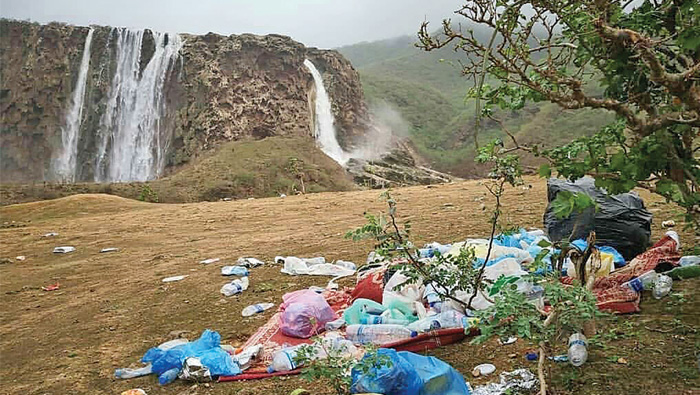
Muscat: Instances of littering in Dhofar, on the eve of the Khareef season, have triggered concern among many.
Representatives from environmental organisations, hoteliers, concerned citizens and residents have spoken out against the irresponsible littering by some tourists.
The Environment Society of Oman (ESO) said that it was imperative to keep areas in and around Salalah free from litter.
“Khareef is here and everyone wants to enjoy Salalah’s natural beauty. Let’s keep Salalah beautiful by keeping public areas clean. It’s simple, if we all clean up after ourselves. Our wadis, parks and mountains must remain enjoyable for all of those who visit,” said Yusra Jaffer, Public Relations Manager, ESO.
Hoteliers in Salalah also said that littering was a nuisance that should be avoided at all costs.
“It’s important that we raise awareness among people about littering and the harm that plastic bags can do. We say, come to Salalah and enjoy all the spots, including the waterfalls and the wadis of Dhofar, but do so responsibly.
“For instance, we don’t give our guests plastic bags, we give them bags made out of fabric. That way they can clean up after themselves,” noted James Hewittson, general manager of Anantara Hotel in Salalah.
Also, Vijay Handa, cluster general manager of Ras Al Jinz and other hotels, agreed that littering, especially plastics, posed a grave threat to tourism and, indeed, to nature.
“Much of this plastic waste ends up in the sea, and who cleans the sea? It is dangerous, in the sense that it can end up in the stomachs of fish and turtles and be fatal to them. It is especially important that we get this message out to tourists ahead of the khareef season.
“I think the big establishments should take the initiative and cut back on, and eventually stop, using plastic. Instead of giving away plastic bags, they can distribute cloth bags for free for about a week. Thereafter, you can ask customers to bring their own cloth bags, and I’m sure they will.
“For us to cut back on the use of plastic, we have to run awareness programmes. That’s what we do at the Ras Al Jinz Turtle Reserve. We have reached out to about 40 schools for that purpose, since catching them young helps,” Handa said.